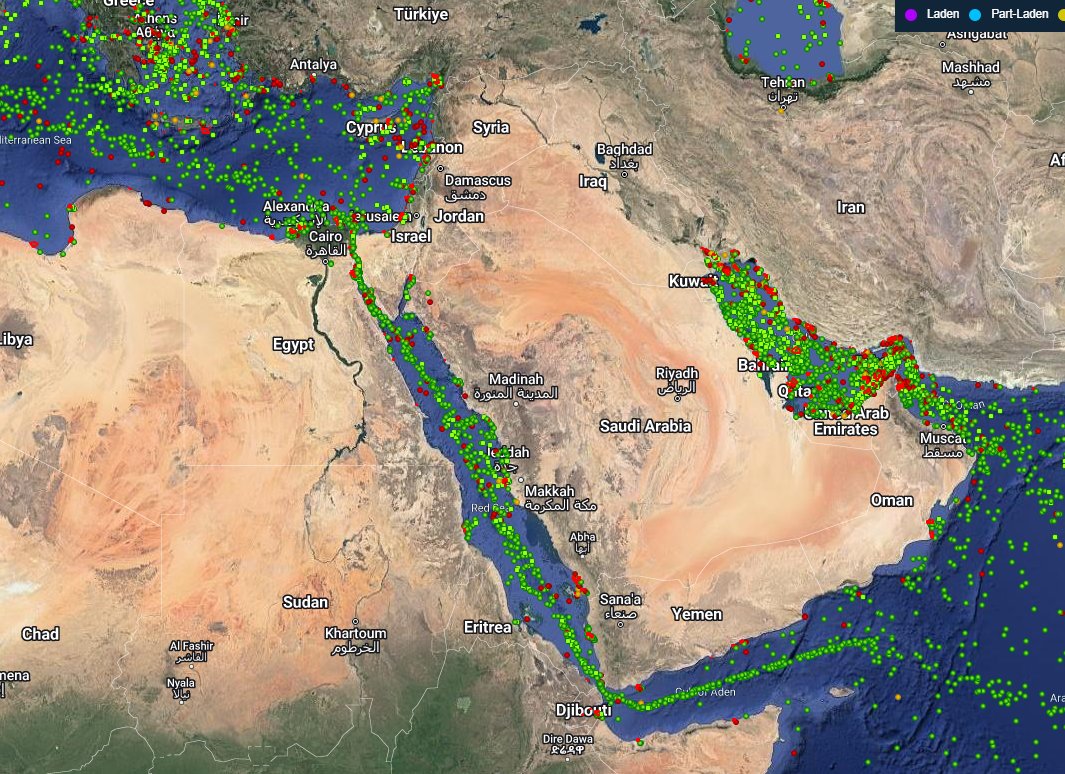Rerouted Realities: Navigating the Geopolitical and Humanitarian Maelstrom in the Red Sea
27-12-2023
Yemen has escalated its maritime assaults in the Red Sea, standing in solidarity with the Palestinian cause in Gaza amid the ongoing conflict with Israel, which is committing egregious acts of genocide and apartheid. The Houthis, the ruling party in Yemen, have vowed to target all Israeli-owned vessels traversing the strategic Suez Canal. Surprisingly, despite widespread condemnation and increasing awareness of the humanitarian crisis in Gaza, Western nations, historically committed to human rights, continue to draw criticism for their perceived passive stance and direct support of Israel. This situation has precipitated a complex geopolitical quandary, leading most Western-owned shipping giants, navigating the treacherous waters of international politics and ethics, to opt for rerouting their vessels. This decision is perceived as a direct endorsement of the controversial policies.
This rerouting decision is not merely a navigational change but signals a deepening of the geopolitical rift, with significant economic repercussions. The longer transit times and increased operational costs contribute to a surge in global shipping expenses, further fueling inflation and exacerbating food crises in vulnerable regions. The disruption in the flow of essential goods, including food and medical supplies, could lead to acute shortages and heightened humanitarian issues worldwide.
The strategic redirection away from the Suez Canal, coupled with the silent complicity of Western nations in the face of alleged atrocities, underscores a growing disillusionment with international diplomacy and a call for a reevaluation of alliances and strategies. The economic, humanitarian, and moral implications of these actions are profound, affecting global commerce, energy supply, and the very principles of international cooperation and human rights.
In light of the unfolding events and their far-reaching implications, this article attempts to unravel the complex web of geopolitical maneuvering, economic challenges, and the moral dilemmas faced by nations worldwide. Below is a list of companies (in alphabetical order) that are considering or have already decided to suspend their shipping routes through the Red Sea, as they navigate the uncertain waters of international politics and commerce:
BP
Oil major BP on Dec. 18 said it had temporarily paused all transits through the Red Sea.
CMA CGM
French shipping group CMA CGM on Dec. 16 said it was pausing all container shipments through the Red Sea.
EQUINOR
Norwegian oil and gas firm Equinor on Dec. 18 said it had re-routed some vessels that had been heading towards the Red Sea.
EURONAV
Belgian oil tanker firm Euronav said on Dec. 18 it would avoid the Red Sea area until further notice.
EVERGREEN
Taiwanese container shipping line Evergreen said on Dec. 18 its vessels on regional services to Red Sea ports would sail to safe waters nearby and wait for further notification, while ships scheduled to pass through the Red Sea would be re-routed around the Cape of Good Hope. It also temporarily stopped accepting Israeli cargo.
FRONTLINE
Norway-based oil tanker group Frontline said on Dec. 18 that its vessels will avoid passages through the Red Sea and the Gulf of Aden in the time ahead, boosting the rates customers must pay for crude transport.
HAPAG-LLOYD
German container shipping line Hapag Lloyd said on Dec. 18 it would re-route several ships via the Cape of Good Hope until the safety of passage through the Suez Canal and the Red Sea could be guaranteed. A projectile believed to be a drone struck its vessel Al Jasrah on Dec. 15, while sailing close to the coast of Yemen. No crew were injured.
MAERSK
Denmark’s A.P. Moller-Maersk on Dec. 15 said it would pause all container shipments through the Red Sea until further notice, following a “near-miss incident” involving its vessel Maersk Gibraltar a day earlier. There is also a further update that they would also be moving their voyage via the cape of good hope for the time being. The ship was targeted by a missile while traveling from Salalah, Oman, to Jeddah, Saudi Arabia, the company said.
MSC
Mediterranean Shipping Company (MSC) said on Dec. 16 its ships would not transit through the Suez Canal, with some already rerouted via the Cape of Good Hope, a day after Houthi forces fired two ballistic missiles at its MSC Palatium III vessel. The decision will disrupt sailing schedules by several days, the Switzerland-based group said.
OOCL
Orient Overseas Container Line (OOCL) has stopped cargo acceptance to and from Israel until further notice, the shipping company owned by Hong Kong-based Oriental Overseas (International) Ltd 0316.HK said on Dec. 16.
YANG MING MARINE TRANSPORT
Taiwan’s Yang Ming Marine Transport said on Dec. 18 it would divert ships sailing through the Red Sea and the Gulf of Aden via the Cape of Good Hope for the next two weeks.
The decision by various global shipping companies to reroute their vessels away from the Red Sea reflects a significant shift in international trade routes, influenced by the escalating conflict and the need to avoid potential threats. This move is not just a logistical change but a political statement, reflecting the complex interplay between international commerce, geopolitical tensions, and ethical considerations. As companies like BP, CMA CGM, Equinor, and others choose alternative paths, the ripple effects are felt in increased shipping costs, extended delivery times, and the broader economic impact of these changes. These decisions are a testament to the fragile nature of global trade networks and the impact of regional conflicts on international cooperation and commerce. As the situation continues to evolve, the world watches and waits to see how these rerouted realities will reshape the geopolitical landscape and what new strategies nations and businesses will adopt in response to these challenges. The need for a balanced approach that considers both security and the humanitarian aspect of trade is more critical than ever, highlighting the intricate relationship between global commerce, politics, and human rights.
Abdi Jama






